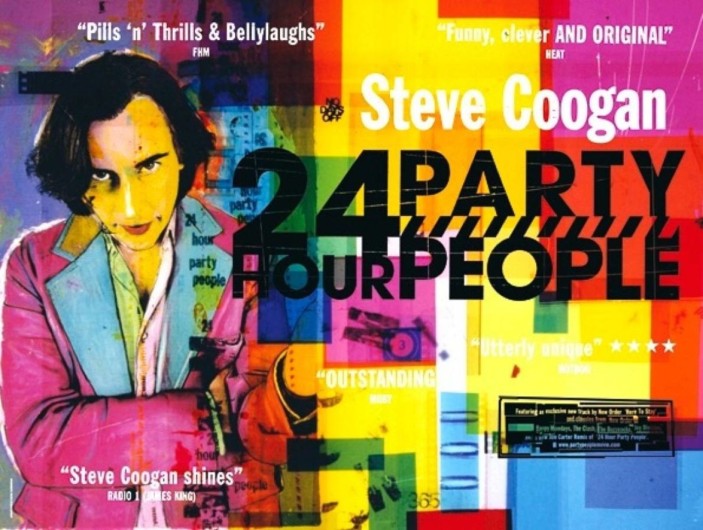
This low-budget 2002 British comedy-drama was directed by Michael Winterbottom. It chronicles the rise of broadcast journalist Tony Wilson (1950-2007) in Manchester from the mid-1970s onward.
Starring Steve Coogan as Wilson, it’s an innovative and intriguing take on the build-up to the Madchester craze in the early 1990s. It also remains an affectionate and funny take on the chaos of the era. Let us party!
24 Hour Party People (the Madchester movie)
Manchester in the 1970s was a hellish urban concrete world of poverty, crippling Tory government rule, and working-class culture. And… well, has anything changed since!? At least the city centre looks a lot nicer now.
In the face of such misery, young people began to rebel through creativity.
Down south in London, punk music formed and The Sex Pistols emerged as the putative answer to the 1960s counterculture movement.
Channelling bands like The Who, young people of the day suddenly realised they could fight back against the dismal failings and greed of the Tory system.
Meanwhile, up north in Manchester, BBC journalist Tony Wilson saw The Sex Pistols perform live and started a TV show about the musical movement.
Prior to that, he worked at Granada doing the likes of news presenting.
And that’s where the film begins, with Wilson (played by comedian Coogan, who went to Manchester University in the 1980s) picking up on the emerging cultural phenomenon.
He quickly set up Factory Records and brought in local Manc bands, with his lead act headed by erratic, epileptic-suffering frontman Ian Curtis – it’s Joy Division.
He oversees the band, too, and once in the studio they meet the notorious Martin Hannett (1948-1991)—here he’s played by motion capture genius actor Andy Serkis prior to his Lord of the Rings fame.
Hannett was something of an unhinged maverick. But his seminal work on Joy Division’s two albums showcase his genius—brooding, dark, macabre, and atmospheric uses of bizarre sound and echoes.
Perfect for Curtis’ voice, although Joy Division’s singer sadly committed suicide aged only 23 before an intended American tour in 1980. His band members formed New Order.
Another one of Wilson’s legendary moves was to start the Haçienda nightclub. This went on to become the biggest club in the world (arguably) in the late 1980s, famed for its rampant drug use, gun crime, dance music, and all that jazz.
These days, incidentally, the Haçienda (it’s still called that) is an apartment block. If you’re ever in Manchester, it’s a small walk from Oxford Road train station.
Despite finishing last in a Battle of the Bands competition, Wilson also enlists the troublesome Happy Mondays.
They, along with other local bands like The Stone Roses (who are, bizarrely, ignored in this film—despite being the leading influence on Madchester in the 1980s) help to define rave culture.
Pill popping, manic dancing, sweat, thumping bass, tinnitus, flared jeans, Reni hats—the second summer of love. It all paved the way for Britpop bands like Blur and Oasis.
Something of a love letter about the era, the film uses (for the time, at least) interesting fourth-wall breaking elements.
Coogan channels some of his Alan Partridge character into his portrayal of Tony Wilson, but does convey a loquacious range as the mildly pretentious broadcaster.
But 24 Hour Party People also documents the collapse of his nightclub—and record label. As Wilson didn’t use contracts with any of his bands, eventually capitalism caught up with him.
But he was also to blame for some dubious expenditure decisions.
Factory Records went bust and in 1997 the Haçienda closed its doors, too.
By then its reliance on ecstasy curbed alcohol sales and fuelled gang violence. The fact it remained open for so long is something of a miracle.
The film? Well, 24 Hour Party People (named after the Happy Monday’s song, incidentally) stands up well to this day.
There’s a lot of emerging talent here. With Paddy Considine, Shirley Henderson, Andy Serkis, and Sean Harris.
Harris plays Ian Curtis—the actor has since gone on to star in two Mission Impossible films and Prometheus.
At the box office it took a meagre $2.6 million. Yet, at college as we were on its 2002 release, it became something of a cult hit with the youth of the day—our mates were all raving about it at Runshaw College.
And the film now stands as a love letter to Manchester’s musical glory years, plus a funny and interesting take on recent history.
The Other Side of Midnight
Up until about a decade ago, Wilson’s face was on the side of the old BBC building on Oxford Road.
That was demolished to make way for a car park, but it’s interesting to remember that his influence across the city was that strong.
But we must highlight a weird anomaly with the film.
For some inexplicable reason, The Stone Roses were written out of 24 Hour Party People. Wilson actually hated the band for many years, but eventually warmed up to them when they had a musical shift circa 1987.
Invited to perform on his show (The Other Side of Midnight), they agreed.
Pictures from the above 1989 performance went on to adorn the band’s legendary eponymous debut album.
In 2001, Wilson caught up with Ian Brown in Manchester for a candid interview.
It’s a cute chat with the often standoffish Brown providing self-effacing insights into his personality. Well worth a watch.
As for Wilson, his legacy lives strong in this here Manchester. He remains a legend.

It sounds like an awesome movie from a great era. Too bad The Stone Roses were written out of it, though.
LikeLiked by 2 people
It’s good fun, yes, and a cool insight into life in Manchester across the ’70s and ’80s. Well worth a watch.
LikeLiked by 1 person
Kind of sounds like Manchester back then was like New York City during that decade.
This is definitely a film I want to check out at some point, being a music fan. Joy Division’s LPs are indeed some of the greatest albums ever recorded.
LikeLiked by 1 person
Potentially for music scene, yes, but in terms of spectacle I can’t see Manchester’s industrial, working-class history matching New York at any point! It’s only in the last 20 years that the city centre has started to look decent.
Well worth a watch, though, I think you’ll appreciate the satirical take on the music and political scene of the time here.
Manchester still has a vibrant music scene, of course, but I wouldn’t say we’ve had anything to match Joy Division of The Stone Roses.
LikeLiked by 1 person
“f you know what I mean, great. If you don’t, doesn’t matter. But you should probably read more.”
LikeLiked by 1 person
Can’t beat a bit of Greek mythology, for sure. And rustic Manc philosophising.
LikeLiked by 1 person
Haha. I don’t know how much Coogan was like the real Wilson but he seemed like quite the guy nonetheless.
LikeLiked by 1 person
I think very dissimilar, but he was able to channel Alan Partidge to give an interesting portrayal.
LikeLiked by 1 person
Hahaha! love the faster but slower scene!
Very interesting slice of Manchester history.
LikeLiked by 1 person
It’s exactly what Martin Hannett said in 1979. Made sense in his head. He just was too out of it for it to make sense for everyone else.
LikeLiked by 1 person
It’s perfect!
LikeLiked by 1 person